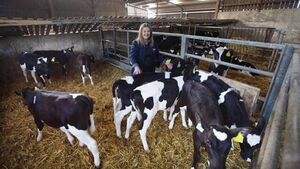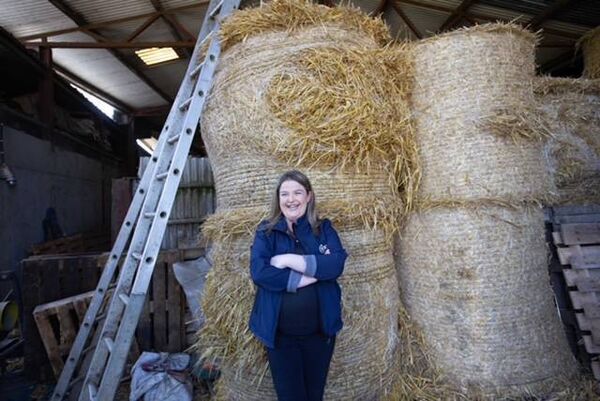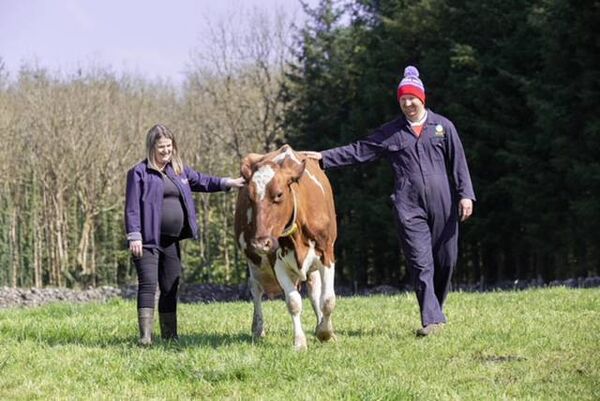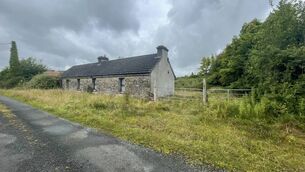Knockcroghery farmer among key figures in organising Macra protest

Niamh Farrell, who is due her first baby in June pictured on the diary farm she runs with her partner, Diarmuid Murray, in Knockcrochery. Pic. Brian Farrell
A future for young people and families in farming is something Niamh Farrell is passionate about.
Niamh who dairy farms in Knockcroghery alongside her partner Diarmuid Murray, was one of the key figures involved in organising a major Macra na Feirme protest walk to Dublin last week to highlight issues facing young people in rural Ireland.
Twenty-six year-year-old Niamh, originally from Headford, is chairperson of Macra na Feirme’s Rural Youth Committee. As she is due her first baby in early June, she drove ahead of the walkers, which included her partner Diarmuid, as they completed their 16 hour, 79km walk from Athy in Kildare to government buildings.
On their arrival in Dublin, the group hand-delivered letters to the Taoiseach and Tanaiste, highlighting eight main issues which Macra want urgently addressed.
They include difficulty in accessing affordable housing, “cumbersome housing planning guidelines”, “disjointed and sparse healthcare services for rural communities,” a lack of public transport for rural Ireland and the imposition of quotas on young farmers availing of grant-aid support.

Niamh said that Macra is determined to take steps for the future to ensure young people and families can live and prosper in rural Ireland. Up to now, she feels a lot of their proposals are falling on deaf ears when they are submitted to Government, including proper engagement on a farming succession scheme.
“Our agriculture committee has continuously sought consultation with the Minister for Agriculture on all of these points and he has failed to act on any of them. Macra have asked for a succession scheme for young farmers rather than an exit scheme,” she said. “The succession scheme that Marca proposed to the Government costs the exact same for the Government as the exit scheme. The succession scheme is going to be paying the retiring farmers the same amount of money as an exit scheme was paying, but it was putting a plan in place in order for young farmers to come into that scheme. But there was no consultation coming back from that document.”

Founded in 1944, Macra is a voluntary organisation representing about 10,000 young people between the ages of 17 and 35 in rural Ireland. Niamh is keen to emphasise that the organisation, which has 200 members in Roscommon, is registered as a rural youth organisation and not a young farmers’ organisation.
“Our national membership now is probably about 15% that have ticked a box to say that they are farmers, and that includes whether you are full-time or part-time farmers. The rest of our membership is made up of lots of young people - nurses, doctors, teachers. One of the doctors sits on Macra’s Rural Youth committee.”
After last week’s protest walk, Niamh and a number of her colleagues were invited into Government buildings to discuss their concerns with the Taoiseach, Minister for Agriculture Charlie McConalogue and junior minister, Pippa Hackett. She described the meeting as positive and was pleased that some commitments were given, such as review of the Government’s current definition of a family farm as ‘average’ and ‘typical’.
“Our fear was that if we were coming out this year saying that we want people to be working on family farms that are average and typical.
This definition is too loose. Diarmuid is currently milking a hundred cows on his farm but his father Sean works on the same farm,” she explained. “Diarmuid’s uncle Seamus works on the same farm and now I’m employed on the same farm and we will have the third generation coming into the same farm, but yet we are not a typical or an average farm.
“Thankfully, the Taoiseach has given a commitment to look at that definition because no two farms are the same and putting a cap on numbers when you might have multigenerations on the one farm.”
The Macra protest yielded positive engagement with the Government but the organisation’s campaign to highlight issues affecting young people in rural Ireland will certainly not let up, according to Niamh.
“We can only hope in the next couple of months that the positive engagement that we had will continue on and that we are brought to the forefront and the table for these conversations,” she said.





